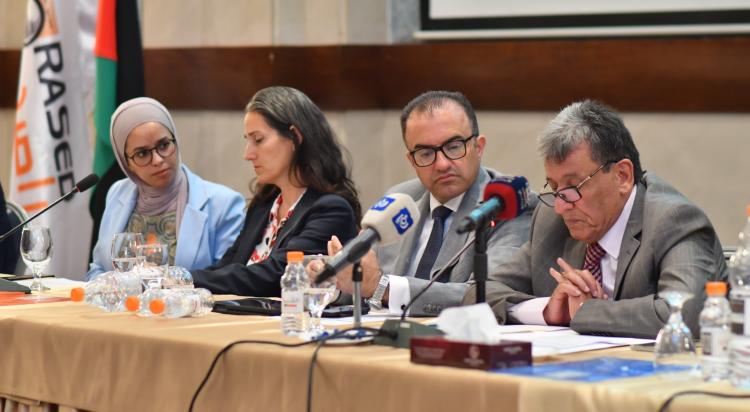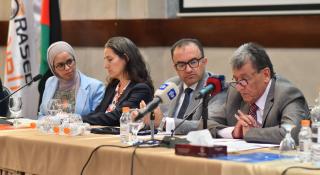“Impact of Political Modernization on Human Rights in Jordan”

“Impact of Political Modernization on Human Rights in Jordan.” A Discussion Forum organized by RASED in collaboration with the Swiss Embassy in Jordan under the patronage of H.E. Wajih Azaizeh
Under his patronage of the discussion forum on the situation of human rights, Azaizeh: "Our progress in the realm of human rights is significant, and it requires a commensurate level of effort to maintain this momentum."
Under the patronage of His Excellency Engineer Wajih Azaizeh, the Minister of Political and Parliamentary Affairs, Al-Hayat Center - RASED, in collaboration with the Swiss Embassy, organized a discussion forum titled "The Impact of Political Modernization on the Human Rights Situation in Jordan". The event was attended by Her Excellency the Swiss Ambassador to Amman, Ms. Emilija Georgieva, and representatives from various civil society organizations, including the coalition of development and human rights activists, as well as women and youth from different governorates.
The Discussion forum aimed to explore the effects of political modernization on human rights in Jordan and support the ongoing efforts to prepare reports for the Universal Periodic Review (UPR) of human rights in the country.
In a forum held today, Thursday, May 4th, the Minister of Political and Parliamentary Affairs, Engineer Wajih Azaizeh, delivered an opening speech emphasizing the progress being made along a positive trajectory. Azaizeh highlighted the importance of equal effort and ongoing dialogue with civil society institutions while discussing the political will manifested through constitutional amendments, enforced laws, and the guidance of His Majesty the King and the High Commission of successive governments.
The minister noted that updated legislation has created historic opportunities for women, youth, and people with disabilities to increase their involvement in political and partisan life. Azaizeh praised the current political modernization process, citing it as evidence of positive growth and the government's commitment to consulting with civil society institutions, particularly those focused on human rights and political participation in Jordan.
Azaizeh discussed the future outlook for the next parliament and the impact of society's quantitative and qualitative engagement, as reflected in the revised election law. The law addresses past loopholes and introduces a new approach to national party lists and local constituency lists. The minister also touched upon the parties law, explaining that it expands the participation base by increasing the number of founders, with a focus on youth and women. This change promotes greater societal interaction and an increased percentage of youth and women representation in elected councils. Azaizeh acknowledged that numerous parties have already made adjustments in accordance with the law's provisions.
During the event, Swiss Ambassador to Jordan, Ms. Emilija Georgieva, highlighted the long-standing relationship between Jordan and Switzerland and the continued support provided to the Jordanian government and its people. She praised the three paths of political, economic, and administrative reform pursued by the Jordanian state and their close connection to the human rights situation. Ambassador Georgieva expressed hope that these reforms would pave the way for legislative action with a positive impact on human rights in Jordan.
The Swiss Ambassador emphasized the importance of supporting collaborative efforts between civil society and the government in various fields, particularly in the completion of the UPR coalition shadow report of human rights. She noted that the UPR offers countries an opportunity to review their human rights practices and serves as a tool for developing recommendations that advance human rights.
Dr. Amer Bani Amer, Director General of Al-Hayat Center - RASED, welcomed the cooperation with the Ministry of Political and Parliamentary Affairs and the partnership with the Swiss Embassy in supporting human rights initiatives. He underscored the importance of collaboration between the government and civil society institutions in preparing reports for the UPR, which aims to improve the human rights situation in Jordan.
Dr. Amer explained that the UPR mechanism is one of the most important global tools for engaging with the human rights system at local, regional, and international levels. It fosters a participatory approach and strengthens cooperation with various stakeholders, promoting accountability in understanding and improving the human rights situation globally. The project is being implemented through Al-Hayat Center - RASED with the support of the Swiss Embassy in Jordan.
